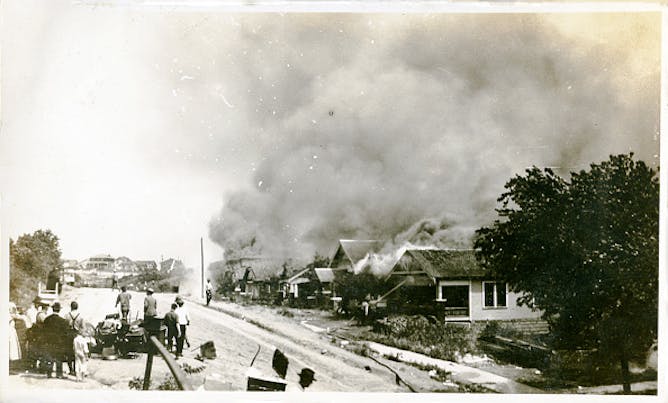|
|
|
|
For most Americans, the Tulsa race riots of 1921 are something they may have read about or seen on TV. For Gregory Fairchild, a business professor at the University of Virginia, the event was part of his family lore. Today Fairchild recounts hearing, as a child, how his family fled the rampage. He also offers a critique of America’s often selective memory when it comes to atrocities and a vision for what it will take to move forward.
Also today:
|
Jamaal Abdul-Alim
Education Editor
|

|
|

Smoke rises from damaged properties after the Tulsa Race Massacre in Tulsa, Oklahoma June 1921.
Oklahoma Historical Society via Getty Images
Gregory B. Fairchild, University of Virginia
More Americans are learning about the 1921 massacre in the prosperous black section of Tulsa known as the 'Black Wall Street.' For Gregory Fairchild, it is a part of his family history.
|
Politics + Society
|
-
Morgan Marietta, University of Massachusetts Lowell
In a 5-to-4 decision, SCOTUS delivered a major blow to Trump and opened the doors to the court being an arbiter of public honesty
-
Calvin Schermerhorn, Arizona State University
In many national crises, black Americans have been essential workers – but serving in crucial roles has not resulted in economic equality.
-
Jennifer Mercieca, Texas A&M University
Donald Trump uses language like a dangerous demagogue. The author of a book on Trump's rhetorical skill gives a guide to the six most important rhetorical strategies Trump uses.
|
|
Science + Technology
|
-
Louis J. Ignarro, Ph.D., UCLA School of Medicine
The body has many natural defenses against viruses and other pathogens. One antiviral molecule produced in the body is nitric oxide and it is created when we breathe in through the nose.
-
Alison J. Marganski, Le Moyne College; Lisa Melander, Kansas State University
Stay-at-home orders and social distancing make technology all the more important for maintaining human connections. They also make it easier for abusers to use technology against their victims.
-
Stephen Schneider, University of Massachusetts Amherst
The tilt of Earth's axis as it orbits the sun results in the seasonal changes.
|
|
Arts + Culture
|
-
Nick Lehr, The Conversation
What do you do when the subject is a disease as much as a person, and when the disease then subsumes the person – to the point where he can't recognize his own son?
|
|
Health
|
-
Siddharth Chandra, Michigan State University; Eva Kassens-Noor, Michigan State University
A century ago, the Spanish flu killed about 50 million people. Today we are battling the coronavirus pandemic. Are we any better off? Two social scientists share five reasons we have to be optimistic.
|
|
Environment + Energy
|
-
Kathryn Moore, Colorado State University; Jun Uetake, Colorado State University; Thomas Hill, Colorado State University
Climate models have been underestimating how much sunlight hits the Southern Ocean. This is because the clouds there are different from clouds anywhere else. Bacterial DNA helped us understand why.
-
Maria Ivanova, University of Massachusetts Boston; Candace Famiglietti, University of Massachusetts Boston
The COVID-19 pandemic has cast a harsh light on global commerce in wildlife. But many accounts focus on demand from Asia, ignoring the role of US and European consumers.
|
|
Economy + Business
|
-
Mirae Kim, Georgia State University; Dyana Mason, University of Oregon
Food panties, the providers of services to the homeless and similar organizations now face enormous challenges.
|
|
From our International Editions
|
-
Neil Levy, University of Oxford; Eric Schliesser, University of Amsterdam; Eric Winsberg, University of South Florida
If expert advice on the pandemic turns out to be wrong, it will have dire consequences for how reliable scientific evidence is treated in other policy areas, such as climate change.
-
Joshua Davies, Université du Québec à Montréal (UQAM); Jesse Reimink, Pennsylvania State University
How the earliest continents formed has been a matter of debate. Analysis of zircons in Canada and Australia suggest that those historical processes are similar to current tectonic movements.
-
David E Kiwuwa, University of Nottingham
History will judge Nkurunziza as a man who brought unnecessary pain to a nation that had long suffered from political misrule.
|
|
| |
| |
| |
| |
| |
| |
|
|
|
|
|
|
|